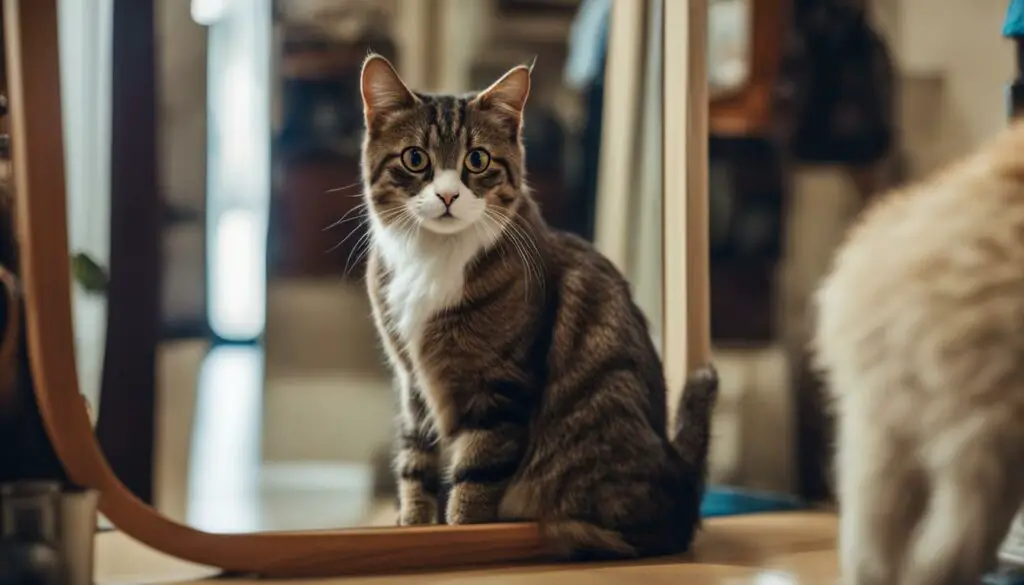Vaccinations are essential in protecting pets from serious and contagious diseases. While the risk of side effects is small, some cats may exhibit unusual behavior after receiving a rabies shot. It’s important to understand the potential reasons behind this behavior and how to ensure your cat’s comfort and well-being.
Key Takeaways:
- Some cats may experience strange behavior after receiving a rabies shot.
- Vaccine reactions in cats are rare but can range from mild to severe.
- Common side effects include soreness, lethargy, decreased appetite, and slight fever.
- Serious reactions, such as anaphylaxis, are rare but require immediate veterinary attention.
- Consult your veterinarian if you have concerns about your cat’s behavior or vaccine reactions.
Understanding Vaccine Side Effects in Cats
Vaccinating cats is an important step in protecting them from serious and contagious diseases. While vaccination reactions are rare, it’s essential to understand the potential side effects in order to ensure your cat’s well-being. Vaccines work by stimulating the cat’s immune system to develop antibodies that can fight off infections. Although adverse reactions to cat vaccinations can occur, they are generally mild and self-limiting.
The most common side effects of cat vaccinations include mild soreness or tenderness at the injection site, lethargy, decreased appetite, and slight fever. These symptoms typically last for a couple of days and resolve on their own. Severe reactions, such as anaphylaxis, are very uncommon but can be life-threatening. It’s important to note that a rare form of cancer called feline injection-site sarcoma (FISS) has been associated with vaccines, although the incidence is low.
To better understand the potential risks, it’s crucial to consult with your veterinarian about your cat’s specific vaccination needs. They can provide you with information about the different vaccines available, the potential side effects, and the best vaccination schedule for your cat. By working closely with your vet, you can ensure that your cat receives the necessary protection while minimizing the risk of adverse reactions.
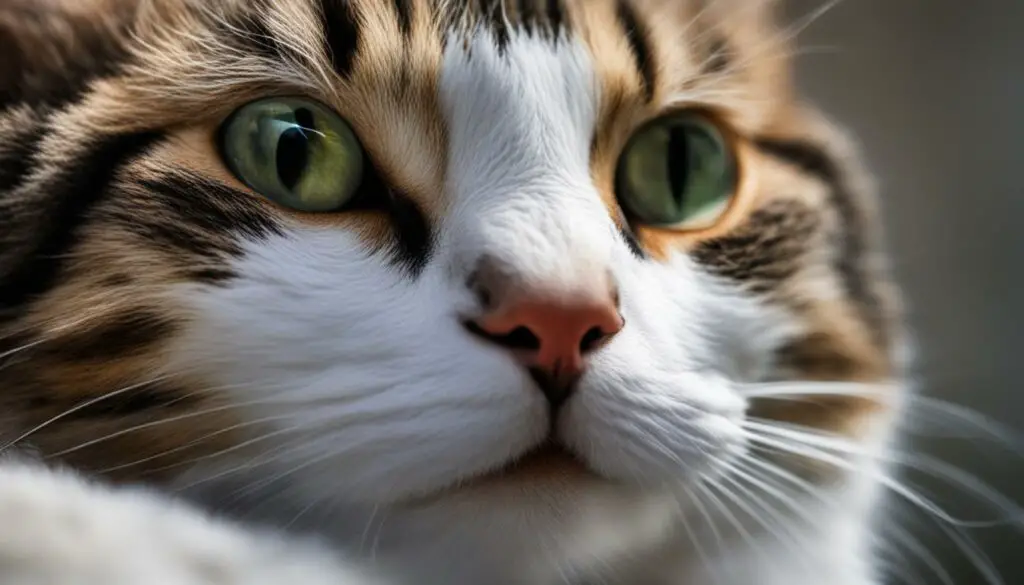
Understanding Vaccine Side Effects in Cats
| Vaccine Side Effects | Symptoms | Management |
|---|---|---|
| Mild reactions | Soreness at injection site, lethargy, decreased appetite, slight fever | Self-limiting; resolves within a few days |
| Severe reactions | Anaphylaxis, vomiting, diarrhea, facial swelling, hives, respiratory distress | Requires immediate veterinary attention; treatment varies depending on severity |
| Feline injection-site sarcoma (FISS) | Rare form of cancer at injection site | Low incidence; consult with your veterinarian for early detection and treatment options |
By understanding the potential vaccine side effects in cats and working closely with your veterinarian, you can ensure that your furry friend receives the necessary protection while minimizing the risk of adverse reactions. Remember to monitor your cat closely after vaccinations and contact your vet if you notice any unusual behavior or persistent symptoms. Your vet is your best resource for guidance and advice when it comes to your cat’s health and well-being.
Common Side Effects of Cat Vaccinations
When it comes to cat vaccinations, it’s essential to be aware of the potential side effects that may occur. While most cats tolerate vaccines well, some may experience mild reactions that are usually self-limiting and resolve within a couple of days. Here are some common side effects of cat vaccinations:
- Mild soreness or tenderness at the injection site
- Lethargy or decreased activity
- Temporary decrease in appetite
- Slight fever
These symptoms are considered mild and should not cause significant concern. However, it’s important to monitor your cat closely after vaccination and contact your veterinarian if the symptoms persist or worsen.
Vaccine side effects can vary depending on the individual cat and the specific vaccine given. It’s important to consult with your veterinarian about potential side effects and what to expect after vaccination. Your veterinarian will be able to provide guidance and address any concerns you may have.
| Vaccine Side Effects | Description |
|---|---|
| Soreness at injection site | Mild discomfort or tenderness at the site of injection. May last for a few days. |
| Lethargy | Decreased activity or energy levels. Normal behavior should return within a day or two. |
| Decreased appetite | Temporary loss of interest in food. Appetite should return to normal shortly. |
| Slight fever | A mild increase in body temperature. Usually resolves on its own without intervention. |
“While it’s important to be aware of the potential side effects, it’s crucial to remember that the benefits of vaccinating cats outweigh the risks. Vaccines protect against serious and contagious diseases, keeping our furry friends safe and healthy.”
Serious Vaccine Reactions in Cats
While serious reactions to cat vaccinations are rare, they can occur. It’s important for cat owners to be aware of the potential risks and symptoms. Two serious vaccine reactions that can occur in cats are anaphylaxis and FISS.
Anaphylaxis in Cats
Anaphylaxis is a severe allergic reaction that can happen shortly after a cat receives a vaccine. Symptoms of anaphylaxis include vomiting, diarrhea, facial swelling, hives, and difficulty breathing. Anaphylaxis is a medical emergency and requires immediate veterinary attention. If you notice any of these symptoms in your cat after a vaccination, contact your veterinarian right away.
FISS in Cats
FISS, or feline injection-site sarcoma, is a rare form of cancer that has been associated with vaccines. The incidence of FISS is very low, but it’s important to be aware of the signs. FISS typically presents as a lump or swelling at the injection site that doesn’t go away within a few weeks. If you notice any unusual lumps or swelling in your cat, especially at the vaccination site, consult your veterinarian for further evaluation.
It’s important to remember that serious reactions to vaccines in cats are rare, and the benefits of vaccination far outweigh the risks. However, being aware of the potential risks and symptoms can help cat owners take prompt action if needed. If you have any concerns about vaccine reactions or if your cat is due for vaccinations, consult your veterinarian for guidance.
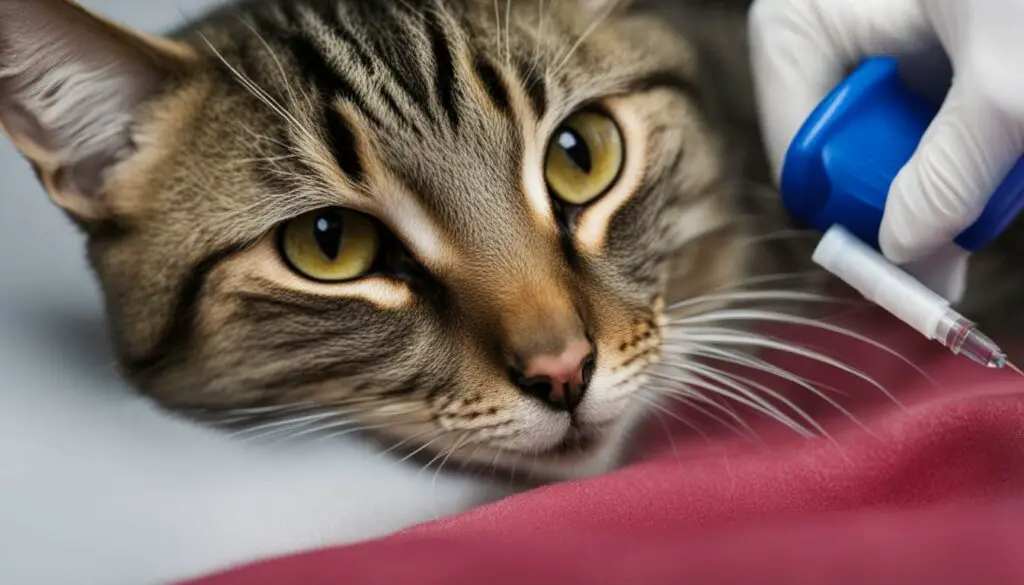
| Vaccine Reaction | Symptoms | Emergency Action |
|---|---|---|
| Anaphylaxis | Vomiting, diarrhea, facial swelling, hives, difficulty breathing | Contact your veterinarian immediately |
| FISS | Lump or swelling at the injection site that persists for weeks | Consult your veterinarian for further evaluation |
Preventing Vaccine Reactions in Cats
When it comes to vaccinating our cats, it’s important to prioritize their comfort and minimize the risk of any adverse reactions. While serious vaccine reactions in cats are rare, taking preventative measures can provide peace of mind for pet owners. Here are some key strategies to reduce vaccine side effects and ensure your cat’s well-being:
1. Inform your veterinarian
If your cat has had a previous reaction to a vaccine or has any underlying health conditions, it’s crucial to let your veterinarian know. By sharing this information, your vet can tailor the vaccination schedule or use alternative methods that may be better suited for your cat’s unique needs.
2. Consider a modified vaccination schedule
In some cases, your veterinarian may recommend a modified vaccination schedule to minimize the chances of adverse reactions. This might involve spreading out the vaccines over multiple visits or adjusting the timing of booster shots. Discussing these options with your vet can help determine the best approach for your cat.
3. Provide a stress-free environment
Reducing stress is essential before, during, and after the vaccination appointment. Cats are highly sensitive to their environment, so creating a calm atmosphere can help alleviate any anxiety. Consider bringing along your cat’s favorite toy or blanket to provide comfort and familiarity during the visit.
4. Monitor for any unusual symptoms
After your cat receives a vaccine, closely monitor their behavior and health for any signs of discomfort or unusual symptoms. While it’s normal for cats to experience mild soreness or lethargy after vaccination, persistent or severe symptoms should be reported to your veterinarian.
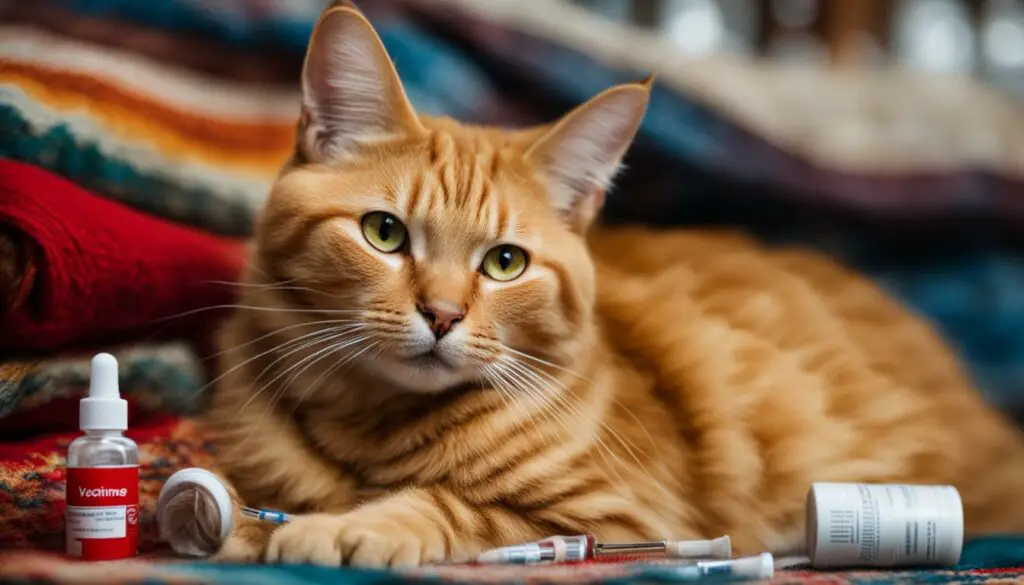
By following these preventative measures, pet owners can mitigate the risk of vaccine reactions in cats. Remember to consult with your veterinarian for personalized advice and guidance based on your cat’s specific needs and medical history.
Treatment Options for Vaccine Side Effects in Cats
While most cats will experience minimal side effects after receiving a vaccine, some may have a reaction that requires treatment. Here are some common treatment options for vaccine side effects in cats:
1. Manage mild signs at home:
If your cat displays mild signs of vaccine side effects, such as soreness at the injection site or lethargy, you can provide comfort at home. Applying warm compresses to the injection site can help alleviate soreness. Additionally, your veterinarian may prescribe pain medication to relieve any discomfort your cat may be experiencing.
2. Hospitalization for severe cases:
In rare cases where cats experience severe vaccine reactions, hospitalization may be necessary. This allows for closer monitoring and the administration of appropriate medical care. Your cat may receive intravenous fluids to maintain hydration and certain medications to manage symptoms or counteract severe allergic reactions.
3. Immediate veterinary attention for anaphylaxis:
Anaphylaxis is a severe allergic reaction that can be life-threatening. If your cat displays symptoms such as vomiting, diarrhea, facial swelling, hives, or difficulty breathing, it’s crucial to seek immediate veterinary attention. Treatment for anaphylaxis may include antihistamines, steroids, and epinephrine to stabilize your cat’s condition.
4. Follow-up with your veterinarian:
After your cat has experienced a vaccine reaction, it’s important to follow up with your veterinarian. They can assess your cat’s condition, provide further guidance on managing any ongoing symptoms, and determine if any additional treatment is necessary.
Remember, vaccine reactions in cats are rare, but it’s essential to be prepared and seek veterinary care if needed. By understanding the treatment options and working closely with your veterinarian, you can ensure your cat’s health and well-being.
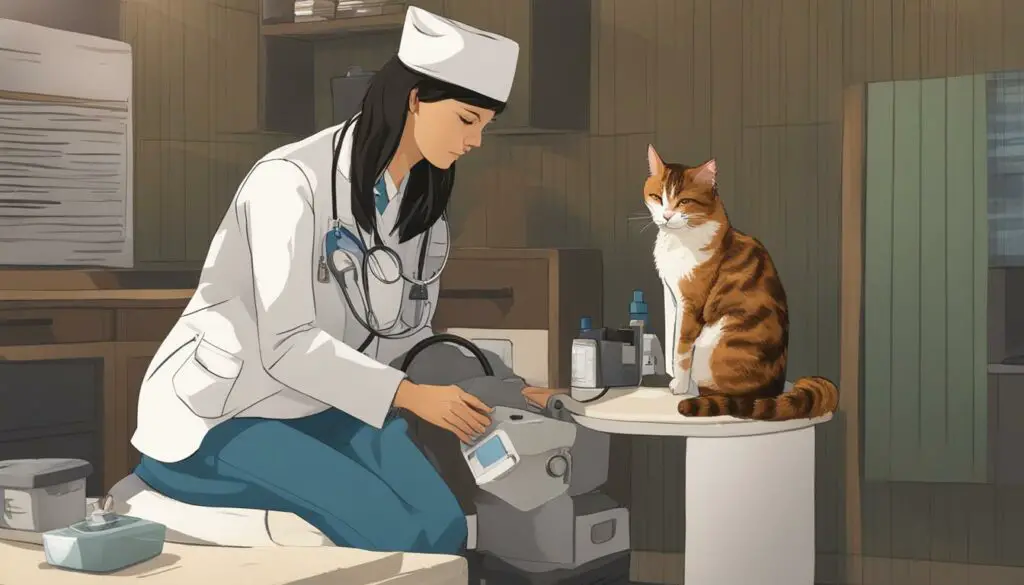
| Treatment Options | Description |
|---|---|
| Manage mild signs at home | Apply warm compresses to the injection site and provide pain medication prescribed by your veterinarian to alleviate soreness and discomfort. |
| Hospitalization for severe cases | In rare instances of severe vaccine reactions, hospitalization may be necessary to closely monitor your cat and administer intravenous fluids and medications. |
| Immediate veterinary attention for anaphylaxis | If your cat experiences symptoms like vomiting, diarrhea, facial swelling, hives, or difficulty breathing, seek immediate veterinary care. Treatment may include antihistamines, steroids, and epinephrine. |
| Follow-up with your veterinarian | After a vaccine reaction, follow up with your veterinarian for further assessment, guidance, and any necessary additional treatment. |
Ensuring Cat’s Comfort During and After Vaccinations
When it comes to your cat’s vaccinations, it’s important to prioritize their comfort before, during, and after the process. Cats can be sensitive to changes in their environment and may experience stress or anxiety during vet visits. To help alleviate their discomfort, create a calm and stress-free environment by keeping the noise level low and providing a familiar blanket or bed for them to relax on.
After the vaccination, it’s essential to monitor your cat for any signs of discomfort or unusual behavior. Some cats may experience mild soreness or tenderness at the injection site, which should resolve within a couple of days. If your cat seems lethargic or has a decreased appetite, it’s important to offer them some extra care and attention. Provide their favorite toys and ensure they have access to fresh water to keep them hydrated.
It’s also worth noting that cats may exhibit different reactions to vaccinations. While these reactions are generally rare, if you notice any concerning symptoms such as vomiting, diarrhea, facial swelling, hives, or difficulty breathing, it’s crucial to seek immediate veterinary attention. These could be signs of a serious vaccine reaction or anaphylaxis, a severe allergic reaction. Your vet will be able to assess the situation and provide appropriate medical care.
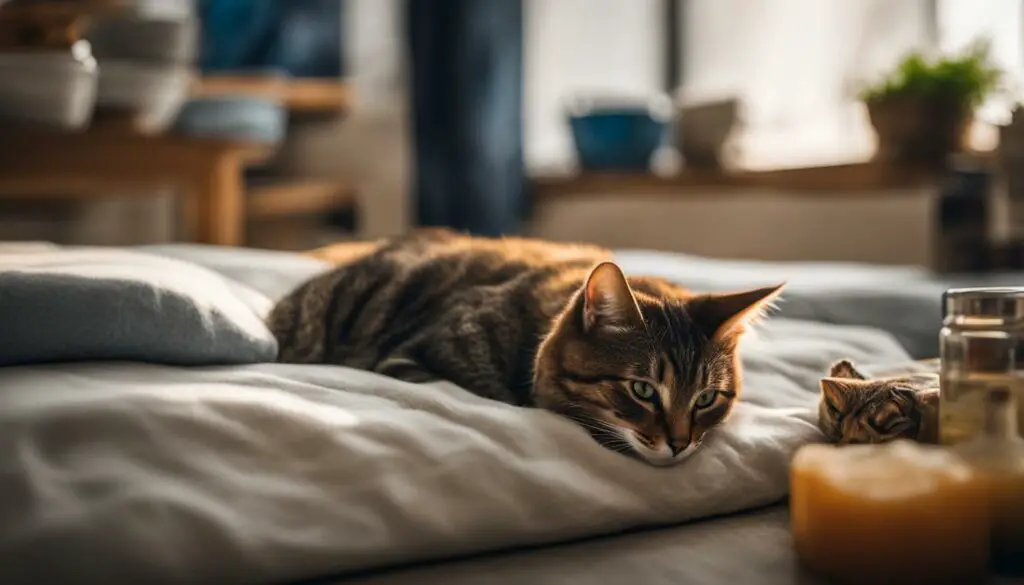
The Importance of Vaccinations in Cats
Vaccinations play a crucial role in maintaining the health and well-being of our feline companions. By protecting cats from serious and contagious diseases, vaccines can prevent long-lasting health issues and even save lives. While there is a small risk of vaccination reactions, the benefits far outweigh the potential risks. Let’s explore the importance of vaccinating cats and the benefits it brings.
By vaccinating our cats, we help create a safer environment not just for them, but also for ourselves and the community. Some diseases that affect cats can be transmitted to humans, known as zoonotic diseases. By preventing and controlling these diseases through vaccinations, we reduce the risk of transmission and protect both our pets and ourselves.
Vaccinations are recommended by veterinary associations worldwide as part of responsible pet ownership. These guidelines help veterinarians determine the appropriate vaccines and vaccination schedules for cats. By following these recommendations, we ensure that our cats receive the necessary protection and minimize the risk of adverse reactions.
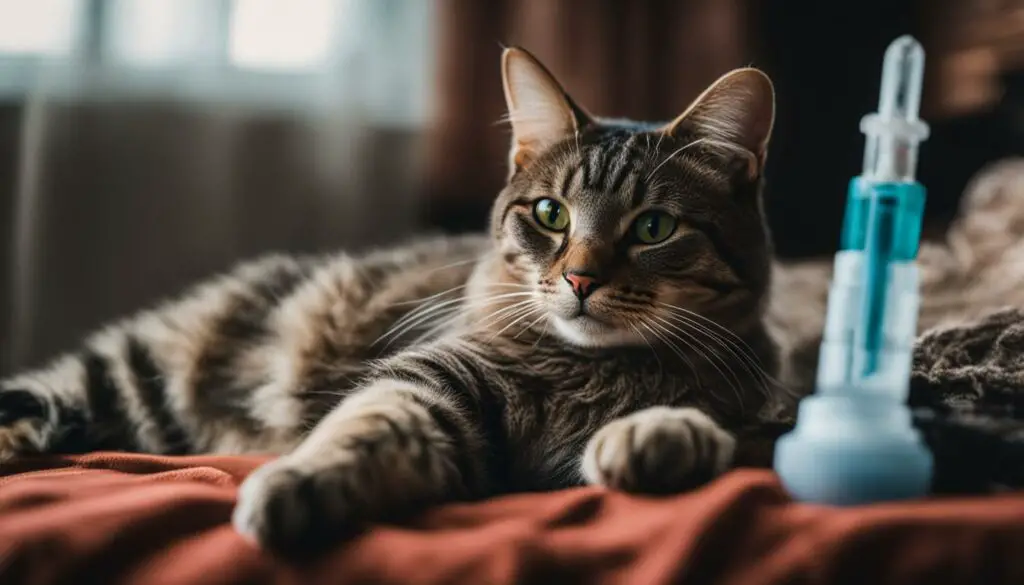
As responsible pet parents, it is our duty to prioritize the health and well-being of our furry friends. Vaccinating cats is one of the most effective ways to safeguard their health and prevent the spread of diseases. Consult your veterinarian to create a vaccination plan tailored to your cat’s needs and ensure they receive the protection they deserve. Remember, the benefits of vaccinating cats far outweigh the risks, making it an essential part of maintaining a healthy and happy feline companion.
Vaccines Recommended for Cats
When it comes to protecting our feline friends, vaccines play a crucial role in preventing serious diseases. There are several vaccines recommended for cats, including both core and non-core vaccinations. Core vaccines are highly recommended for all cats, regardless of their lifestyle or exposure risk. Non-core vaccines, on the other hand, are recommended based on the cat’s individual needs and lifestyle factors.
Core Vaccines
The core vaccines for cats include the FVRCP vaccine, which protects against feline viral rhinotracheitis, calicivirus, and panleukopenia. These diseases are highly contagious and can be severe, even fatal, especially in young and unvaccinated cats. The FVRCP vaccine is typically administered in a series of vaccinations during kittenhood, followed by boosters throughout the cat’s life.
The rabies vaccine is another core vaccine that is required by law in many states. Rabies is a deadly disease that can be transmitted to humans, making it essential to vaccinate all cats against this virus. The rabies vaccine is usually given as a single injection, with subsequent boosters based on local regulations.
Non-core Vaccines
Non-core vaccines are recommended based on individual factors such as the cat’s lifestyle, environment, and potential exposure risks. One example of a non-core vaccine is the feline leukemia virus (FeLV) vaccine. FeLV is a contagious and potentially life-threatening disease, especially in cats that have outdoor access or live in multi-cat households. The FeLV vaccine is typically given to kittens and may be recommended for adult cats based on their risk factors.
Other non-core vaccines include the feline immunodeficiency virus (FIV) vaccine, which is recommended for cats at high risk of exposure to this virus, and the feline infectious peritonitis (FIP) vaccine, which is currently less commonly used due to its limited effectiveness.
| Vaccine | Recommended For |
|---|---|
| FVRCP | All Cats |
| Rabies | All Cats (Required by Law) |
| FeLV | Kittens, Outdoor Cats, Multi-cat Households |
| FIV | High-Risk Cats |
| FIP | Case-Specific |
It’s important to consult with your veterinarian to determine the most appropriate vaccine schedule and options for your cat. Your vet will consider factors such as your cat’s age, health status, lifestyle, and potential exposure risks to create a tailored vaccination plan that ensures your cat receives the necessary protection while minimizing the risk of adverse reactions.
Vaccinations for Immunocompromised Cats and Cats with Past Reactions
When it comes to vaccinating cats with compromised immune systems or those who have experienced previous vaccine reactions, special considerations are necessary. Consultation with your veterinarian is crucial to determine the best approach for minimizing the risk of adverse reactions while still providing necessary protection for your feline friend.
For immunocompromised cats, vaccination decisions should be made on a case-by-case basis. Your veterinarian will assess your cat’s overall health and determine if it is safe to administer vaccines. In some cases, certain vaccines may be contraindicated or need to be modified to reduce the risk of adverse effects.
Cats with a history of vaccine reactions require careful management. Your veterinarian will review the type of reaction and its severity to determine the best course of action. This may involve altering the vaccination protocol, such as spacing out vaccines or using alternative vaccine formulations. Close monitoring before, during, and after vaccination is essential to promptly identify any signs of adverse reactions.
Vaccine Protocols for Cats with Past Reactions
When creating a vaccine protocol for cats with past reactions, your veterinarian may consider the following strategies:
- Performing a thorough evaluation of the cat’s medical history and previous vaccine reactions
- Opting for non-adjuvanted vaccines, which are associated with lower instances of adverse reactions
- Administering vaccines individually, instead of in combination, to identify specific triggers
- Utilizing pre-vaccination medications, such as antihistamines or steroids, to reduce the risk of reactions
- Implementing a delayed vaccination schedule, allowing for a longer interval between vaccinations
Remember, every cat is unique, and individualized vaccination plans are essential for those with compromised immune systems or previous vaccine reactions. Discussing your cat’s specific needs with a trusted veterinarian will help ensure their safety and well-being.
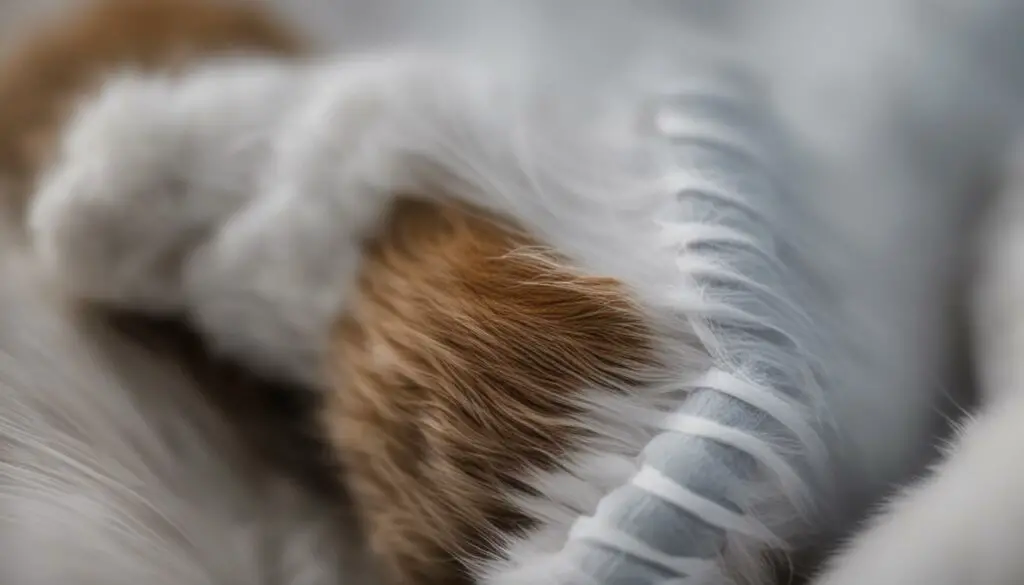
Trusting the Experts: Veterinary Guidelines for Vaccinations
When it comes to ensuring the health and well-being of our cats, it’s important to trust the expertise of veterinarians. Veterinary associations, such as AAHA (American Animal Hospital Association), AVMA (American Veterinary Medical Association), and AAFP (American Association of Feline Practitioners), provide guidelines for cat vaccinations. These guidelines help veterinarians determine the appropriate vaccines and vaccination schedules for cats, taking into consideration factors such as age, lifestyle, and geographical location.
By following these veterinary guidelines, we can ensure that our cats receive the necessary protection while minimizing the risk of adverse reactions. Vaccination protocols may vary depending on the individual cat’s needs and health history. For example, cats with compromised immune systems or previous vaccine reactions may require a modified vaccination schedule to reduce the chances of adverse events.
It’s important to note that these guidelines are continuously reviewed and updated based on the latest scientific research and expert opinions. Veterinarians stay up-to-date with the current recommendations to provide the best possible care for our feline companions. By trusting in these guidelines and seeking veterinary advice, we can navigate the world of cat vaccinations with confidence and make informed decisions for our cats’ health.
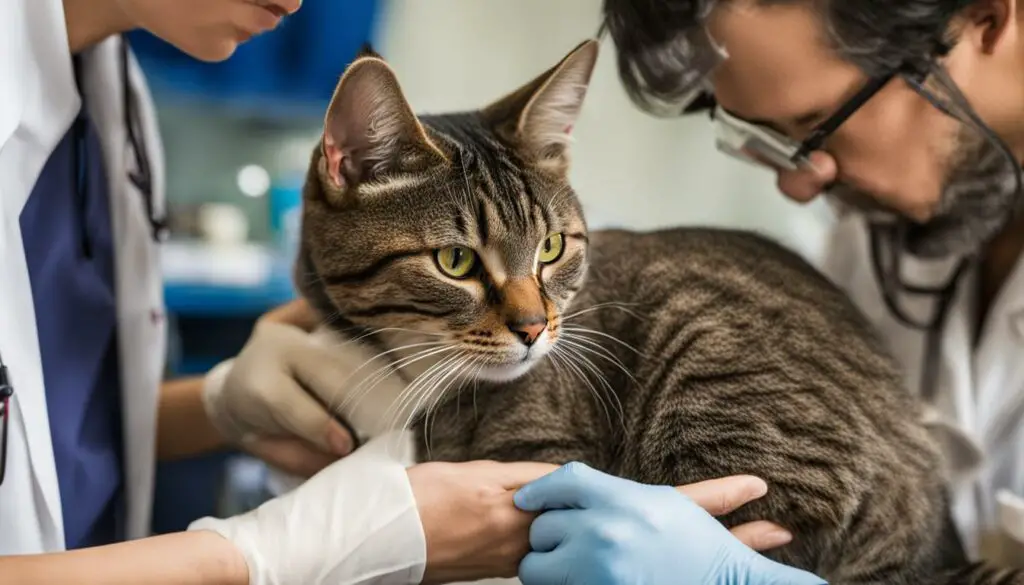
Understanding the Role of Vaccines in Public Health
Vaccines play a crucial role in not only protecting the health and well-being of our beloved cats but also in safeguarding public health. Zoonotic diseases, which can be transmitted between animals and humans, pose a significant risk to both populations. By vaccinating our cats, we can help reduce the spread of these diseases and ensure the safety of our furry friends and ourselves.
Some zoonotic diseases that can affect cats include rabies, toxoplasmosis, and cat scratch disease. Rabies is a deadly viral infection that can be transmitted to humans through bites or scratches from infected cats. By vaccinating cats against rabies, we can effectively prevent the transmission of this dangerous disease to both animals and humans.
In addition, toxoplasmosis, caused by the Toxoplasma gondii parasite, can be transmitted to humans through the ingestion of contaminated cat feces or undercooked meat. While the risk to humans is typically low, vaccinating cats against this parasite can help reduce the overall prevalence of toxoplasmosis in the cat population, ultimately minimizing the risk to humans.

The Importance of Vaccinating Cats
Vaccinating cats not only protects them from potentially life-threatening diseases but also helps create a healthier environment for all. By adhering to recommended vaccination protocols and ensuring our cats receive the necessary vaccinations, we contribute to the larger goal of public health and the well-being of our communities.
Consultation with Your Veterinarian
If you notice any unusual behavior or signs of a vaccine reaction in your cat, it’s crucial to consult your veterinarian. They are the trusted experts who can assess the situation, provide appropriate advice, and ensure the health and well-being of your furry companion.
Vaccine reactions in cats are rare, but when they occur, it’s essential to seek veterinary guidance. Your veterinarian will have the knowledge and experience to determine whether the behavior is related to the rabies shot or if there might be other underlying factors at play. They can perform a thorough examination of your cat and recommend appropriate diagnostic tests if necessary.
Don’t hesitate to reach out to your veterinarian if you have any concerns or questions about your cat’s behavior after the rabies shot. They can provide reassurance and guidance to help you navigate through this situation. Remember, the health and well-being of your cat should always be the top priority, and your veterinarian is there to support you in providing the best care.
| Key Takeaways |
|---|
|
Conclusion
After a rabies shot, it is rare for cats to exhibit strange behavior. However, it’s essential to monitor your cat for any signs of discomfort or unusual behavior. If you notice anything concerning, it’s best to contact your veterinarian for guidance and support.
Remember, ensuring your cat’s well-being is a top priority. Providing a calm and stress-free environment during and after vaccinations can help keep your feline friend comfortable. Offering favorite toys, a cozy bed, and access to fresh water can contribute to their overall well-being and recovery.
While vaccination reactions are uncommon, it is crucial to trust and follow your veterinarian’s advice. They are experts in their field and can provide tailored recommendations to minimize risks and maximize the benefits of vaccination. By working together with your vet, you can ensure that your cat receives the necessary protection while minimizing the risk of adverse reactions.
In conclusion, although strange behavior after a rabies shot in cats is rare, it’s important to stay vigilant and prioritize your cat’s health. By monitoring their behavior, seeking veterinary advice when needed, and maintaining a safe and comfortable environment, you can help ensure your cat’s well-being and provide them with the protection they need.
FAQ
Why is my cat acting weird after a rabies shot?
Unusual behavior in cats after a rabies shot can occur in rare cases. It’s important to monitor your cat for any signs of discomfort or unusual behavior and contact your veterinarian if you have concerns.
What are the side effects of cat vaccinations?
Common side effects of cat vaccinations may include mild soreness or tenderness at the injection site, lethargy, decreased appetite, and slight fever. These symptoms usually resolve within a few days.
Can cat vaccinations cause serious reactions?
While serious reactions to cat vaccinations are rare, they can occur. Symptoms of a serious reaction may include vomiting, diarrhea, facial swelling, hives, and respiratory distress. Anaphylaxis, a severe allergic reaction, requires immediate veterinary attention.
How can I prevent vaccine reactions in my cat?
To minimize the risk of vaccine reactions in cats, inform your veterinarian about any previous vaccine reactions or underlying health conditions. Your vet may recommend modifying the vaccination schedule or using alternative methods.
What options are available to treat vaccine side effects in cats?
Mild signs of vaccine reactions in cats can be managed with warm compresses or pain medication prescribed by your veterinarian. Severe cases may require hospitalization and medical care, including IV fluids and certain medications.
How can I ensure my cat’s comfort during and after vaccinations?
To keep your cat comfortable during and after vaccinations, provide a calm and stress-free environment during the vet visit. Monitor them for any signs of discomfort or unusual behavior and offer favorite toys, a cozy bed, and fresh water.
Why are vaccinations important for cats?
Vaccinations in cats protect them from serious and contagious diseases that can have long-lasting effects on their health. Vaccination is recommended by veterinary associations as a responsible pet parent’s duty.
Which vaccines are recommended for cats?
The most common vaccines recommended for cats include FVRCP, which protects against contagious respiratory and gastrointestinal infections, and the rabies vaccine, which is required by law in many states. Discuss options with your veterinarian.
What about vaccinations for immunocompromised cats or those with past reactions?
Cats with compromised immune systems or previous vaccine reactions require special considerations. It’s important to discuss the risks and benefits of vaccination with your veterinarian and tailor vaccine protocols to their individual needs.
Where can I find veterinary guidelines for cat vaccinations?
Veterinary associations such as AAHA, AVMA, and AAFP provide guidelines for cat vaccinations. These guidelines help veterinarians determine the appropriate vaccines and vaccination schedules for cats.
How do cat vaccinations contribute to public health?
Vaccinating cats not only protects them but also helps reduce the risk of zoonotic diseases that can be transmitted from cats to humans. It plays an important role in keeping both pets and humans safe.
What should I do if I notice any signs of a vaccine reaction in my cat?
If you notice any unusual behavior or signs of a vaccine reaction in your cat, it’s crucial to consult your veterinarian. They will assess the situation, provide appropriate advice, and ensure your cat’s health and well-being.
Should I be concerned if my cat is acting weird after a rabies shot?
While it is uncommon for cats to exhibit strange behavior after a rabies shot, it can happen in rare cases. Monitoring your cat and contacting your veterinarian if you have concerns is important to ensure their comfort and well-being.

